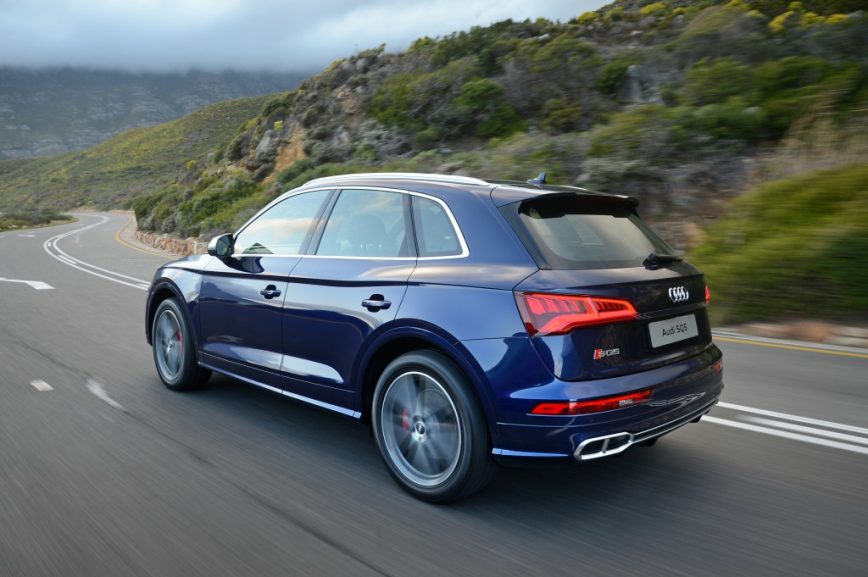The Power of Q – the all-new Audi Q5…
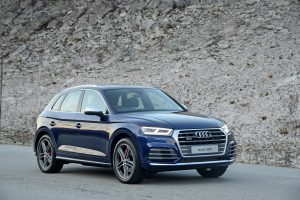
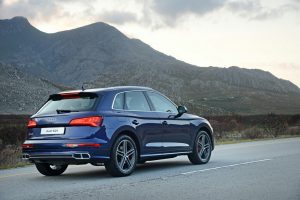
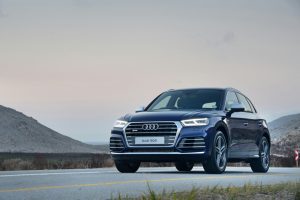
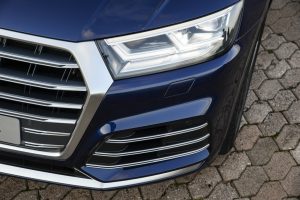
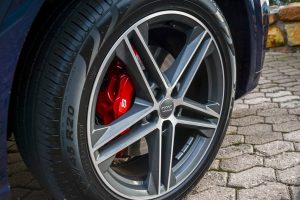
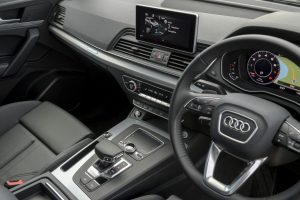
Audi South Africa is proud to announce the introduction of the all-new iteration of its best-selling SUV, the Audi Q5. The B-segment SUV combines the sportiness of an Audi sedan with a multifaceted character and a highly flexible interior. Whether in its connectivity, efficiency or driver assistance systems – the new Audi Q5 once again sets standards in its segment.
The first Audi Q5 was for many years the world’s best-selling SUV in its class. Since its international launch in 2008, it has sold more than 1.6 million units worldwide. Launched in South Africa in 2009, it has sold 11,300 units locally.
Design:
The new SUV takes a sporty but elegant stance on the street. A sculpturally flared Singleframe grille with a solid frame dominates its aerodynamically flat front end. It is available with headlights that are either in LED or high-resolution Matrix LED technology with dynamic turn lights.
A distinctively curved and strongly undercut shoulder line gives structure to the side view. The strongly emphasized wheel arches are a reference to the quattro permanent all-wheel drive system, and the roofline tapers back down early. Just as at the front, horizontal lines at the rear convey an image o
f width and presence. When specified with LED lights (standard on Sport models), the tail lights also come with dynamic turn signals. The tailgate wraps around the C-pillars – a typical feature of the Q models from Audi. A diffuser insert integrates the exhaust tailpipes.
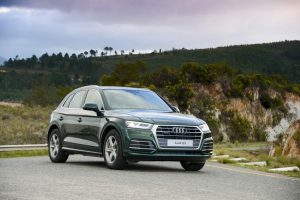
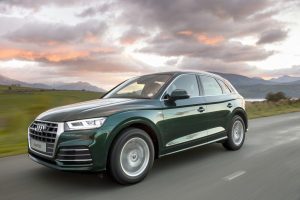
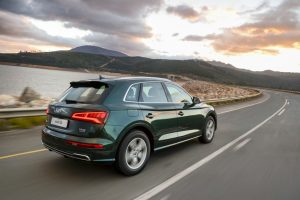
At 4.66 metres long, 1.89 metres wide and 1.66 metres tall with a 2.82 metre wheelbase – compared to the previous model, the new Q5 has grown in nearly all of its dimensions. Consequently, the unladen weight was reduced – depending on the
engine – by up to 90 kg compared to the previous model. Steels with maximum tensile strength and aluminium form an intelligent material mix in the body.
The new Q5 also stands at the top of its class in its aer
odynamics. The four-cylinder versions attain a cd figure of 0.30 with the aerodynamically optimized roof. Wind noises are exceptionally low, and vibration comfort is high – the new SUV from Audi indulges the driver and passengers with the best interior acoustics in its class.
The interior offers a lot of space for five persons, and it surpasses the previous model and its competitors in key dimensions. Its horizontally oriented lines underscore the impression of width and comfort, and a three-dimensional trim strip runs across the entire width of the instrument panel.
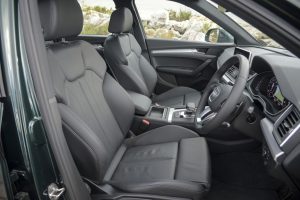
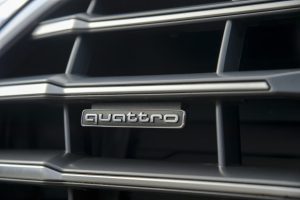
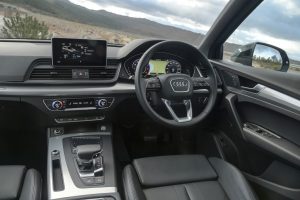
The rear seat back of the new Audi Q5 is split into three segments. Depending on the rear seat position, the basic volume of the luggage compartment ranges from 550 to 610 litres, 10 litres more than in the previous model. When the
rear bench is folded down, this volume grows to 1,550 litres. Cargo loading is simplified by intelligent solutions like a standard, variably folding mat, optional sensor control of the power tailgate and manual lowering of the body via the optional air suspension.
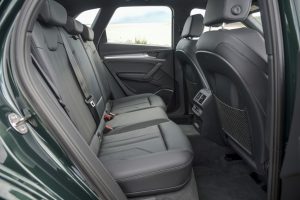
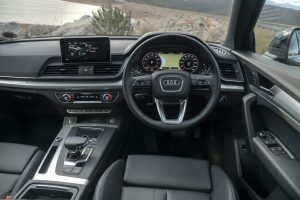
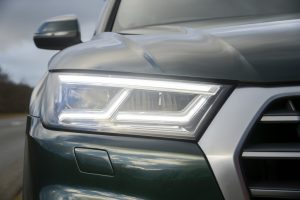
Engines:
The new Audi Q5 is launching in South Africa with two powerful and efficient engines: one TDI engine and one TFSI. They have added up to 20 kW of power, with fuel consumption however being significantly reduced.
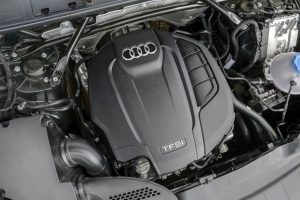
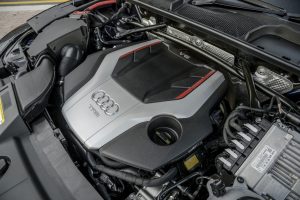
The four-cylinder TDI has a displacement of 1,968 cc and is available with an output of 140 kW and
400 Nm of torque available between 1,750 and 3,000 rpm. It will take 7.9 seconds for the sprint from 0 to 100 km/h and corresponds to a top speed of 218 km/h. It has claimed combined consumption of 4.9 litres per 100km and a combined CO2 emissions figure of 129 g/km.
The further developed 2.0 TFSI has an output of 185 kW and 370 Nm of torque, yet it only consumes 6.8 litres of fuel per 100 km, which equates to 154 grams of CO2 per km. in this engine, the sprint from 0-100 km/h will take 6.3 seconds.
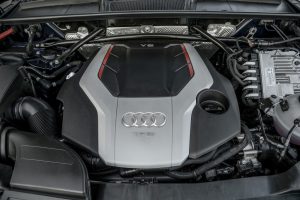
The drivetrain of the mid-size SUV has been redeveloped from the ground up – the automatic transmissions integrate a fuel-saving freewheel function. The driver controls it by a selection lever or by shift paddles on the steering wheel; in both cases, the control signals are transmitted electronically.
quattro ultra:
The new quattro drivetrain with ultra technology, also known as “quattro on demand”, is standard equipment for the range. The quattro with ultra technology always disengages the rear-axle drive whenever it is not needed, and if necessary it can proactively re-engage it. The new concept boosts efficiency without reducing traction or driving dynamics. The intelligent operating strategy permanently monitors the route, driver and driving status, and predictively distributes the drive torque to the front and rear axle. The quattro drive is already active before the need arises.
The driver feels the familiar, superior driving dynamism, benefits from the additional safety reserves thanks to outstanding traction and uses discernibly less fuel in everyday driving. At the predictive level, the focus is on the 150 sensors that the networked systems deliver 100 times per second in the car.
From this data, the controller calculates the point at which the front wheel on the inside of the bend will reach its grip limit. In doing this, it calculates about 0.5 seconds in advance. If the wheel approaches a defined degree of its grip limit, the all-wheel drive becomes active. The system only needs 200 milliseconds to fully activate quattro. Furthermore, the quattro controller orientates itself primarily on the driving style of the driver, on the status of the ESC as well as on the mode set with the Audi drive select function and on trailer detection.
Depending on the situation, up to 100 % of the drive force can be transmitted to the front or the rear axle. If the driving situation does not require quattro (for example while doing a constant speed on the highway), the vehicle switches to more efficient front-wheel drive. Here, for permanent adaptation, the vehicle’s sensors use all information that refers to the respective present and future vehicle state, for example, surface friction coefficient, wheel rotational speed, engine torque, steering angle, accelerator position, road inclination, driver type recognition and MMI navigation systems. In most cases the quattro drive is, therefore, activated predictively even before a driving situation such as acceleration or driving round a bend, necessitates all-wheel drive. This will happen without the driver even recognizing the difference.
Even with quattro drive, wheel-selective torque control gives handling a refined touch. The intelligent software solution always delivers a dynamic, precise and controllable driving experience.
The new Audi Q5 enables handling that combines very different strengths – it is sporty while being extremely comfortable. Creating the basis for this are the newly developed five-link suspensions and also the new electromechanical power steering system. Dynamic steering is available as an option; it varies its gear ratio according to the driving speed and steering angle.
Customers can choose from two extension stages of springs and damping. The chassis with damper control offers a very wide spread between comfort and dynamics, which the driver can select via Audi drive select. In addition to adjusting damper control, the new adaptive air suspension can be used to vary the ride height of the car body over five stages.
In the standard system, Audi drive select, which accesses various technical modules, the driver can select one of as many as seven driving modes. The two new modes, lift/offroad and allroad, emphasize the offroad character of the Audi Q5 optimally.
Infotainment and driver assistance systems:
Operation of the new Audi SUV is intuitive and is marked by three great new features. The optional Audi virtual cockpit presents brilliant graphics on its high-resolution 12.3-inch screen. The driver can choose from two views – a classic view with large round instruments and a mode in which the navigation map or lists dominate. Also optionally available is a newly developed head-up display which projects relevant information onto the windshield – including from driver assistance systems – as symbols and numbers that can be perceived quickly.
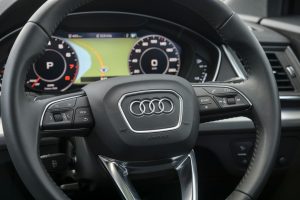
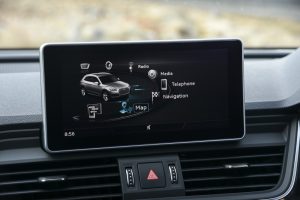
The MMI terminal in the centre console acts as the main control element. In the top infotainment system, the MMI navigation plus with MMI touch and an 8.3-inch display, a touchpad is integrated into the rotary pushbutton. It recognizes handwritten entries as well as gestures such as zooming.
The MMI operating logic is based on the flat hierarchies used in today’s smartphones, and it offers such features as intelligent free-text search. The new natural-language voice control function also recognizes inputs from everyday speech.
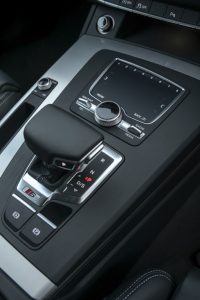
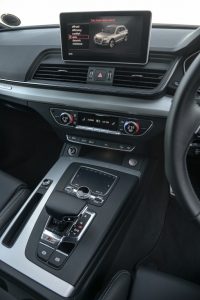
The Audi phone box connects smartphones to the vehicle’s antenna for optimal reception quality; it also charges smartphones inductively according to the Qi standard. The Bang & Olufsen Sound System with innovative 3D sound introduces the spatial dimension of height. The Audi smartphone interface also brings Apple CarPlay and Android Auto into the new Q5.
In its driver assistance systems, the new Audi Q5 also tops its segment with a broad range of high-tech options. In their intelligent interplay, the systems represent a next step towards piloted driving. Adaptive cruise control (ACC) including traffic jam assist can handle some of the steering work in slow-moving traffic. Audi active lane assist makes it easier to stay in lane while the distance warning alerts the driver when the distance to a vehicle drops below a safe distance.
Cross traffic assist rear, the exit warning system, collision avoidance assist and turn assist are other new features that perform excellently in pursuit of safety. The same applies to the pre sense systems – Audi pre sense city is a standard feature which warns of pedestrians and vehicles and may initiate automatic emergency braking within system limits.
Dynamic and emotional: the new Audi SQ5
The new Audi SQ5 has a 2,995 cc, V6 TFSI engine with an output of 260 kW. The turbocharged, aluminum engine delivers a constant 500 Nm of torque from 1,370 to 4,500 rpm. The sprint from zero to 100 km/h is completed in 5.4 seconds; while top speed is an electronically governed 250 km/h. The new Audi SQ5 3.0 TFSI consumes just 8.3 litres of fuel per 100 kilometre – a CO2 equivalent of 189 grams per kilometre.
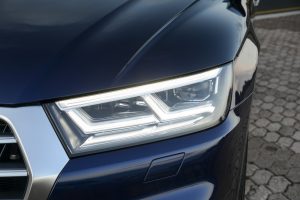
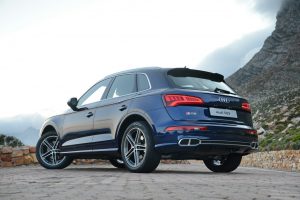
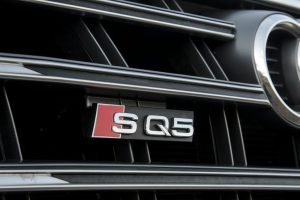
A new combustion process developed by Audi makes the 3.0 TFSI particularly efficient. It is based on the so-called “B cycle” process in combination with high-pressure injectors centrally located in the combustion chambers. With its artificially shortened compression phase, the B cycle enables an engine process with a significantly higher base compression ratio. Combined with a power stroke that, while normal, is longer relative to the compression stroke, this allows for more efficient combustion and increased engine efficiency.
Under part load, the Audi valvelift system enables a very short intake aperture duration coupled with the early closure of the intake valve. This shortens the intake phase. At higher loads, the system switches to a camshaft contour with a longer opening time and a larger valve stroke. The engine then operates with a normal compression ratio and maximum throughput.
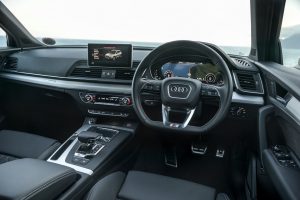
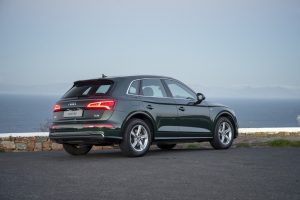
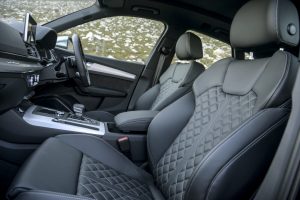
The turbocharger, which replaces the mechanical compressor of the previous engine, operates according to the twin-scroll principle. The exhaust branches of the two cylinder banks run separately in the exhaust manifold and in the turbocharger housing, and only merge before the turbine wheel. This technology improves the flow characteristics for more spontaneous turbine response, and is key factor behind the early and powerful development of torque. The turbocharger is located within the 90-degree V of the cylinder banks. This arrangement allows a compact design and minimal flow losses. As a consequence, the 3.0 TFSI responds extremely spontaneously and directly.
A fast and smooth-shifting, eight-speed tiptronic transmits the power in the new Audi SQ5.
The lower gears feature short, sporty ratios, while the upper gears are long to reduce revs and fuel consumption. Provided that the function is activated in Audi drive select, the transmission automatically switches to freewheeling mode as soon as the driver lifts his foot off the accelerator at speeds between 55 and 160 km/h for even greater fuel efficiency.

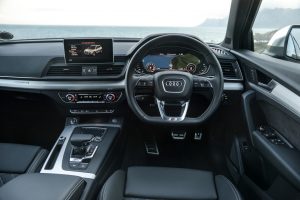
The quattro permanent all-wheel drive contributes to the sporty handling. During normal driving, it distributes the engine power with a slight rear-axle bias. When necessary, the lion’s share of the power is sent to the axle with the better traction. Wheel-selective torque control is active on all types of surfaces. During dynamic cornering, the software function slightly brakes the inside wheels. The car turns itself into the curve ever so slightly. Turn-in behavior remains neutral longer, and handling is stable, precise and agile.
The optional sport differential further optimizes handling by actively distributing torque between the rear wheels via two superposition stages. It sends more torque to the outside rear wheel when accelerating out of particularly tight radii, making the Audi SQ5 even more agile. The sport differential literally pushes the car into the curve, nipping understeer in the bud. Its management is integrated into the Audi drive select control system, and it runs over a central control unit, the electronic chassis platform.
A five-link suspension front and rear lays the foundation for the sporty driving characteristics of the new Audi SQ5. The complex design provides for greater stability at the limit and combines increased agility with significantly improved comfort. The standard damper control features a particularly wide spread between comfort and dynamic. The adaptive CDC dampers (continuous damping control) are integrated into the Audi drive select system along with the engine, steering, tiptronic and optional sport differential. This lets the driver control the characteristics of the engine and suspension over several modes.

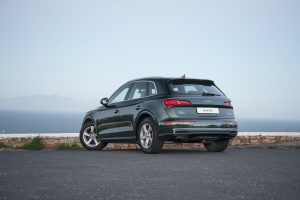
Available additionally is the S-specific adaptive air suspension which allows the driver to adapt not just the damping, but also the ride height to the respective driving situation. The new electromechanical power steering with S-specific tuning is an important contributor to the driving dynamics of the SQ5.
Even when stationary, an array of details underline the dynamic characteristics of the new Audi SQ5. The bold, sporty bumpers up front and in the rear are complemented by more strongly contoured, S-specific air inlets and the diffuser with a honeycomb grille. Another S-specific feature is the radiator grille with double aluminum slats and contrasting trim elements in matt twilight gray. The S logo with red rhombus is used in numerous locations to set additional accents.
LED technology is standard for all lighting functions. The dynamic turn signals ensure a high recognition factor. On the sides of the vehicle, aluminum-look exterior mirrors gleam and door trim strips in the body color underscore the sporty character. The rear bumper houses an aluminum diffuser clasp. The exterior color panther black is reserved exclusively for the new Audi SQ5.
The dark-toned interior welcomes the driver and passengers with illuminated door sills bearing exclusive S logos. Contrasting stitching on the leather steering wheel and sport seats create a dynamic and elegant ambiance. The S sport seats in Alcantara/leather can be upgraded to fine Nappa leather with diamond pattern and a pneumatic massage function. Aluminum-look shift paddles enable the driver to quickly shift the tiptronic’s gears while the pedals and footrest are surfaced with stainless steel.
Standard equipment
New trim lines provide numerous customization opportunities, for both the interior and the exterior. Besides the base model, there is also the Sport line which offers additional equipment to enhance the sporty look of the vehicle. The S line sport package is available for sophisticated customization, particularly for the interior. Audi offers the S line exterior package for a particularly dynamic appearance.
The following equipment is available as standard on the 2.0T FSI 185 kW and 2.0 TDI 140 kW:
- 17-inch wheels
- Ambient lighting package (30 colours)
- Audi drive select®
- Audi sound system
- Bluetooth interface
- Collapsible spare wheel
- Cruise control
- Driver information system
- Dynamic suspension
- AUX-IN and USB
- Electromechanical power steering
- Energy recovery
- Indirect tire pressure monitoring system
- Leather multifunction plus steering wheel
- Leather/artificial leather combination
- LED rear lights
- quattro® with ultra technology
- Rear parking aid
- Side airbags at front and head airbag system
- Stainless steel loading edge protection
- Three-zone automatic air conditioning
- Start / Stop (petrol engines!)
- Xenon headlights
In addition, the Sport models will feature the following equipment:
- 18-inch wheels
- Aluminium door sill trim
- Bumpers in full paint finish
- High gloss package
- Interior inlays with aluminium
- LED headlights
- Line specific radiator grille
- Line specific rear diffuser and air intakes
- Sport seats
- Steering wheel with chrome
The Audi SQ5 will have the following standard equipment over and above the rest of the range:
- 20-inch wheels
- 4-way lumbar support for the front seats
- Exterior mirror housings in aluminium look
- Frequency Alcantara/leather combination
- Electrically adjustable front seats
- High-gloss package
- Indirect tire pressure monitoring system
- LED headlights
- LED rear lights with dynamic indicator
- Luggage compartment lid, electrically opening and closing
- MMI Navigation plus with Audi connect
- Matt brushed aluminium inlays
- Park assist including parking system plus
- Pedals and footrest in stainless steel
- quattro with self-locking centre differential
- Roof spoiler
- Scuff plates in door apertures
- Side airbags at front and head airbag system
- Sports steering wheel, flat bottomed
- Sports seats in front
- Start/stop system
- Three-zone automatic air conditioning
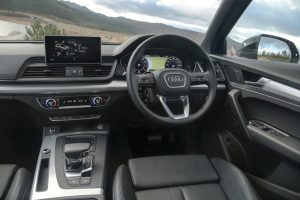
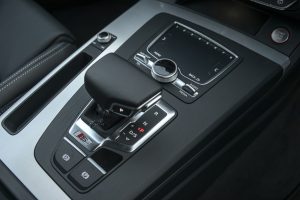
Pricing
The Audi Q5 range will be priced as follows, standard with the 5 year/100 000km Audi Freeway Plan and inclusive of all taxes:
| · Q5 2.0 TDI quattro S tronic: R 698,000
· Q5 2.0 TDI quattro S tronic Sport: R 748,000 · Q5 2.0 TFSI quattro S tronic: R 747,500 · Q5 2.0 TFSI quattro S tronic Sport: R 797,500 · SQ5 3.0 TFSI quattro Tiptronic: R 1,044,000 |


